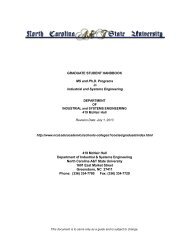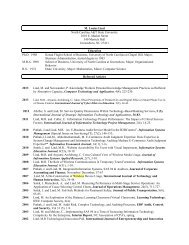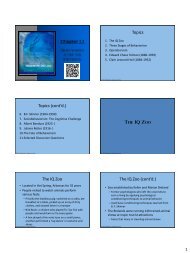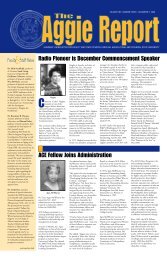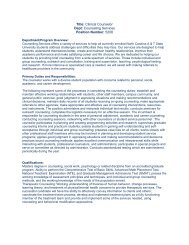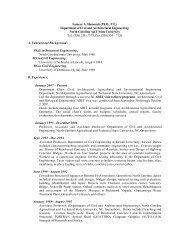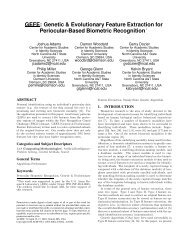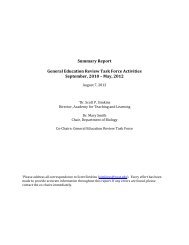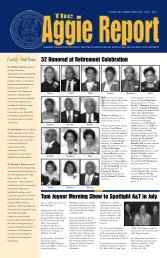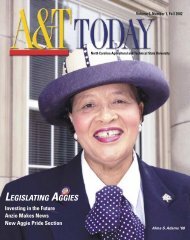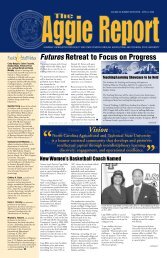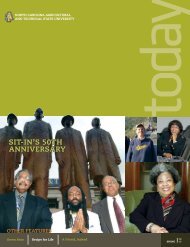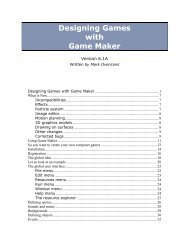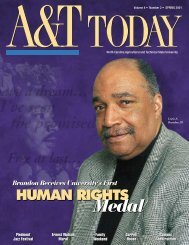STRAIGHT TO THE TOP - North Carolina A&T State University
STRAIGHT TO THE TOP - North Carolina A&T State University
STRAIGHT TO THE TOP - North Carolina A&T State University
You also want an ePaper? Increase the reach of your titles
YUMPU automatically turns print PDFs into web optimized ePapers that Google loves.
Spring<br />
2K<br />
11<br />
Specifically, their innovative work will go a long way in<br />
the advancement of solutions to aid orthopedic and cranial problems.<br />
Straight<br />
to the Top<br />
Two A&T students go<br />
directly into a doctoral<br />
program upon receiving<br />
their bachelor’s degrees.<br />
By Jeuron O. Dove ’08<br />
In today’s uncertain economic climate, many<br />
recent college graduates have found that<br />
furthering their education at the master’s<br />
or doctoral level has become a necessity to<br />
compete in the local and global marketplace.<br />
However, few dream it possible to go straight<br />
into a doctoral program after receiving the<br />
bachelor’s degree.<br />
As part of their doctoral studies, Chris Smith (top photo, left) and Leon White (bottom)<br />
are conducting research on biomaterials that can be used in biomedical applications.<br />
Chris Smith, 23, and Leon White, 21,<br />
graduated from <strong>North</strong> <strong>Carolina</strong> A&T <strong>State</strong><br />
<strong>University</strong> with B.S. degrees in mechanical<br />
engineering, Smith in 2009 and White<br />
in 2010, only to find themselves back at<br />
N.C. A&T working toward a doctorate<br />
in mechanical engineering through the<br />
university’s National Science Foundation<br />
Engineering Research Center (ERC) for<br />
Revolutionizing Metallic Biomaterials.<br />
“We were very pleased with their<br />
performance as undergraduates and that<br />
is why we decided to recruit them into the<br />
program,” said Samuel Owusu-Ofori, chair<br />
of the mechanical engineering department.<br />
Owusu-Ofori said that not just anyone is<br />
selected into the program, citing that the<br />
majority of the students participating are<br />
26-27 years old with master’s level and realworld<br />
work experience in the field. “We feel<br />
that they can make it,” he added.<br />
Smith, a native of Cleveland, Ohio, entered<br />
A&T in 2005, and White, a native of Largo,<br />
Md., came in 2006. Both had outstanding<br />
academic records upon graduation<br />
and were active in several engineering<br />
honor societies. Smith interned with the<br />
Renewable Energy Department of the<br />
Chevron Oil Company and the National<br />
Park Services, while White interned with<br />
Hewlett Packard and <strong>North</strong>rop Grumman,<br />
the latter company being the world’s fourth<br />
largest defense contractor.<br />
“As I got closer to my senior year, I began to<br />
realize that I didn’t want a typical nine to<br />
five working lifestyle,” said White. That was<br />
a notable admission considering he had job<br />
offers in excess of $70,000.<br />
However, their future plans would<br />
change after a series of encounters with<br />
Jagannathan Sankar, Distinguished<br />
<strong>University</strong> Professor and White House<br />
Millennium Researcher, who is director of<br />
the ERC. Sankar was the guiding force that<br />
pushed them to enter the program.<br />
“These students really believed in my vision<br />
for the ERC and they’re just some great guys<br />
overall,” described Sankar.<br />
Both students worked with the ERC as<br />
undergraduates and fully believed that<br />
entering into the program would be in<br />
the best interest for where they wanted to<br />
go in their future careers. However, there<br />
were natural insecurities that arose when<br />
they began to fully grasp the magnitude<br />
of the opportunity they had been afforded.<br />
White recalls that he never realized the full<br />
importance of the program until he was in<br />
it and admitted to moments along the way<br />
where he hit the proverbial brick wall:<br />
“When I came in, I felt like much of what<br />
I would be doing would be similar to<br />
what I did as an undergrad; but I quickly<br />
discovered there was a steep learning curve.”<br />
One of the major differences was that<br />
outside of class, the majority of their time<br />
is spent conducting research in the labs.<br />
Coming from a mechanical engineering<br />
background into a program with such a<br />
heavy emphasis on bioengineering also<br />
posed a mental hurdle they had to<br />
quickly overcome.<br />
The research the pair carries out deals<br />
primarily with the creation of biomaterials<br />
that can be used in biomedical applications.<br />
Specifically, their innovative work will go a<br />
long way in the advancement of solutions to<br />
aid orthopedic and cranial problems.<br />
Smith’s main research focus is on the<br />
processing of porous and non-porous<br />
magnesium alloys with a focus on the<br />
elemental composition of calcium,<br />
magnesium, zinc.<br />
White diverts his attention to magnesium<br />
anodization, an electrolytic process that<br />
essentially puts a natural outside layer onto<br />
a metal surface to prevent its corrosion<br />
rate. By using an anodized layer, White<br />
hopes to create biodegradable implants<br />
that are more resistant to corrosion.<br />
To learn more about this process, White<br />
participated in a weeklong study this past<br />
November at the Hannover Medical School<br />
in Hannover, Germany. The school is one of<br />
the global research partner institutions of the<br />
ERC and a leader in bioimplant technologies<br />
within the Euro Union. Sankar believes his<br />
students must learn from the best minds to<br />
become global leaders themselves.<br />
Interacting with the diverse faculty and<br />
students of the ERC on a daily basis gives<br />
Smith and White an edge that others<br />
of similar age and experience in the<br />
research arena may lack. They also work<br />
with colleagues of very diverse cultural<br />
and ethnic backgrounds such as those of<br />
African, East Asian, Middle Eastern and<br />
Russian descent.<br />
“This has been my first real introduction<br />
to the world. Whenever you think of<br />
globalization, you think of diversity and<br />
being around different people. If you<br />
are around one group of people, you’re<br />
generally getting one perspective; but being<br />
around others helps you to think at another<br />
level,” explained Smith. He says this type of<br />
interaction has made him a better individual<br />
on a professional and personal level.<br />
Leonard Uitenham, chair of the chemical<br />
and bioengineering department, also was<br />
supportive of their decision from the outset.<br />
“There is such a temptation to go<br />
immediately into the workforce after<br />
graduation and I commend these two<br />
for taking this important step. There is a<br />
certain amount of attraction that comes<br />
with getting this type of degree at such an<br />
early age,” Uitenham said. “The fact that<br />
two African American men are doing this<br />
is great, but don’t get me wrong, this would<br />
be a tremendous accomplishment for any of<br />
our students, period.”<br />
Sankar added that taking this initiative and<br />
earning the Ph.D. will put them ahead of<br />
the competition when it comes to pursuing<br />
their future career objectives and making<br />
them into true leaders. He anticipates that<br />
one of the proudest moments of his career<br />
will be their (next) commencement.<br />
Aside from the research and academic<br />
scope of this endeavor, there is a special<br />
bond that connects the young men<br />
to Sankar. White used an analogy of<br />
basketball legend Michael Jordan to<br />
describe Sankar’s approach.<br />
“It’s like Jordan with his six championship<br />
rings and numerous accolades, yet he still<br />
takes out the time to help kids at basketball<br />
camps. Sankar has done so much in his<br />
lifetime, yet he still wants those around him<br />
to become better,” White said.<br />
22 | today today | 23



